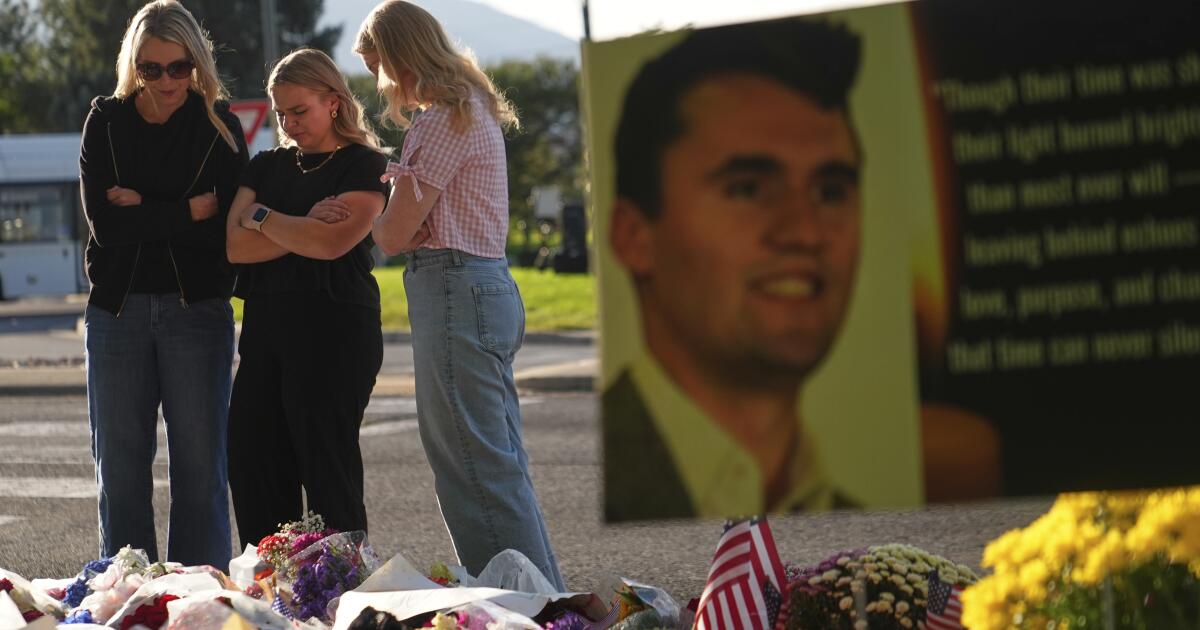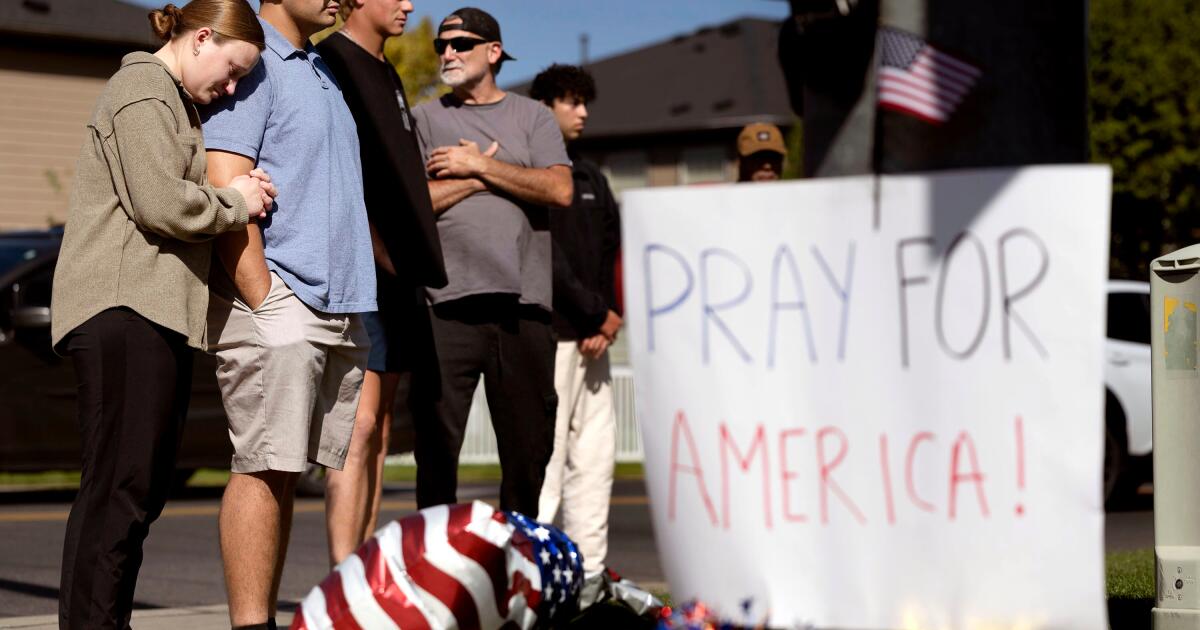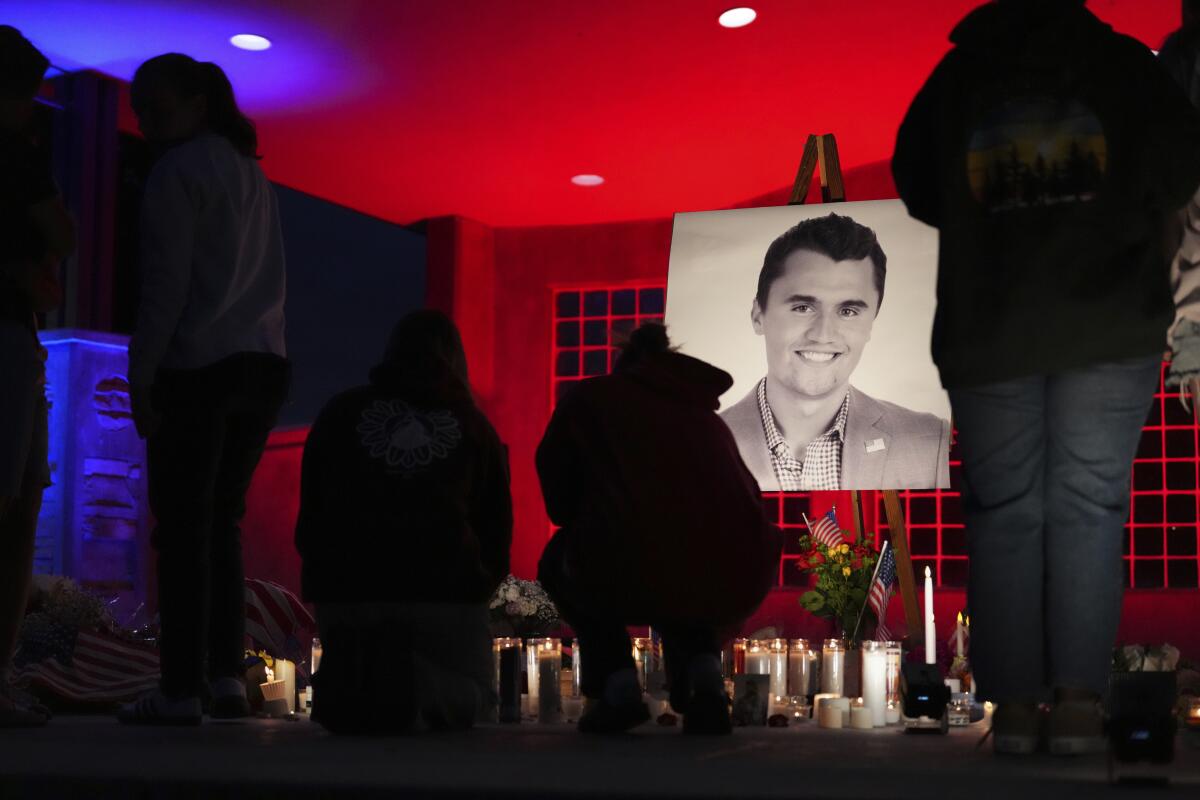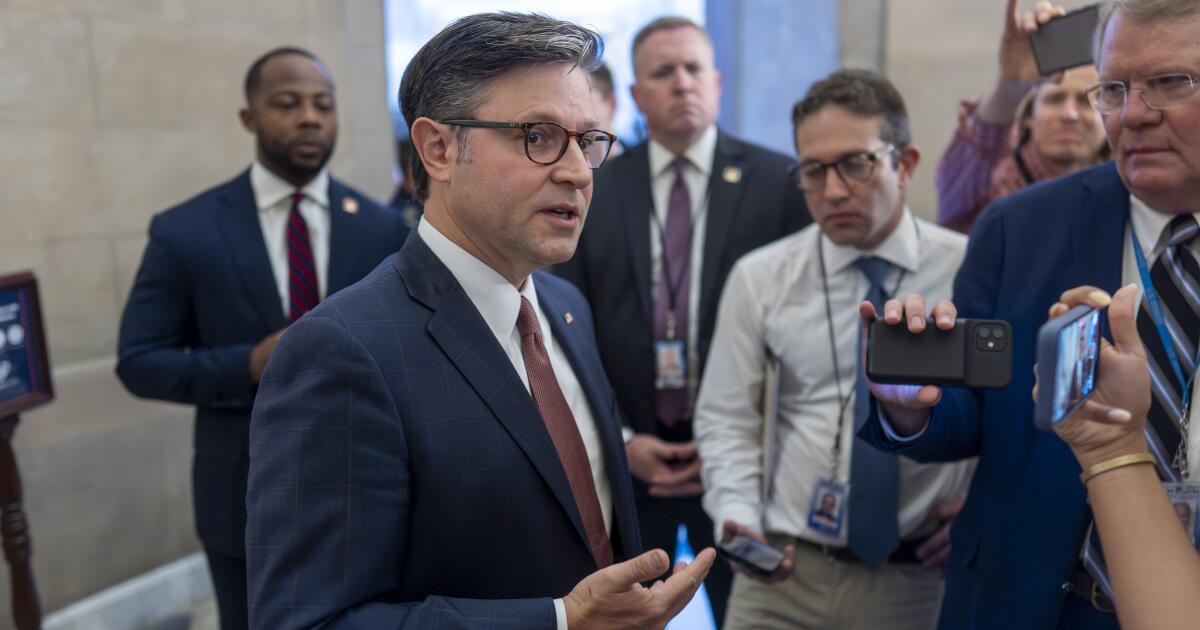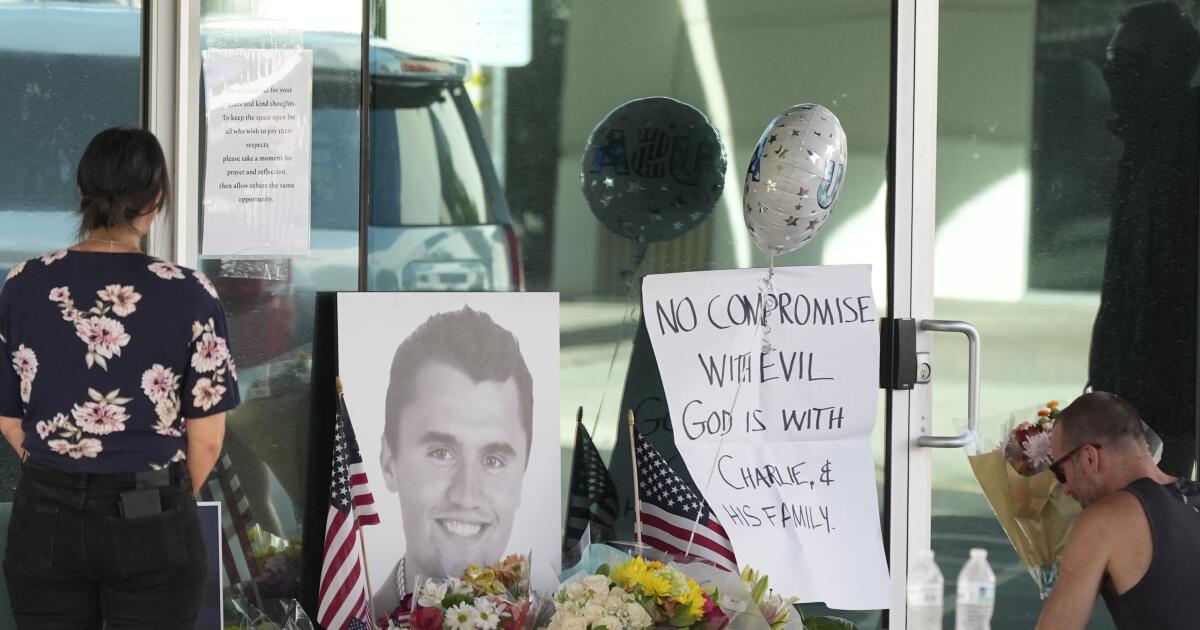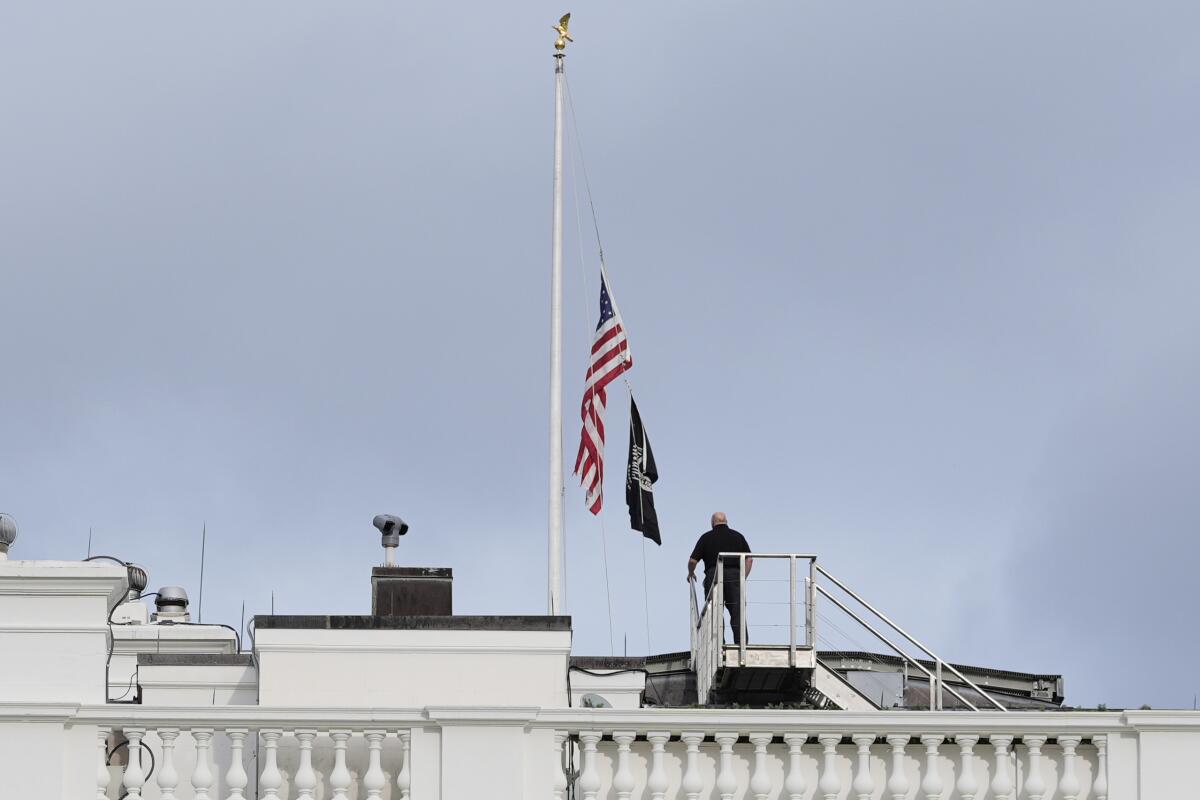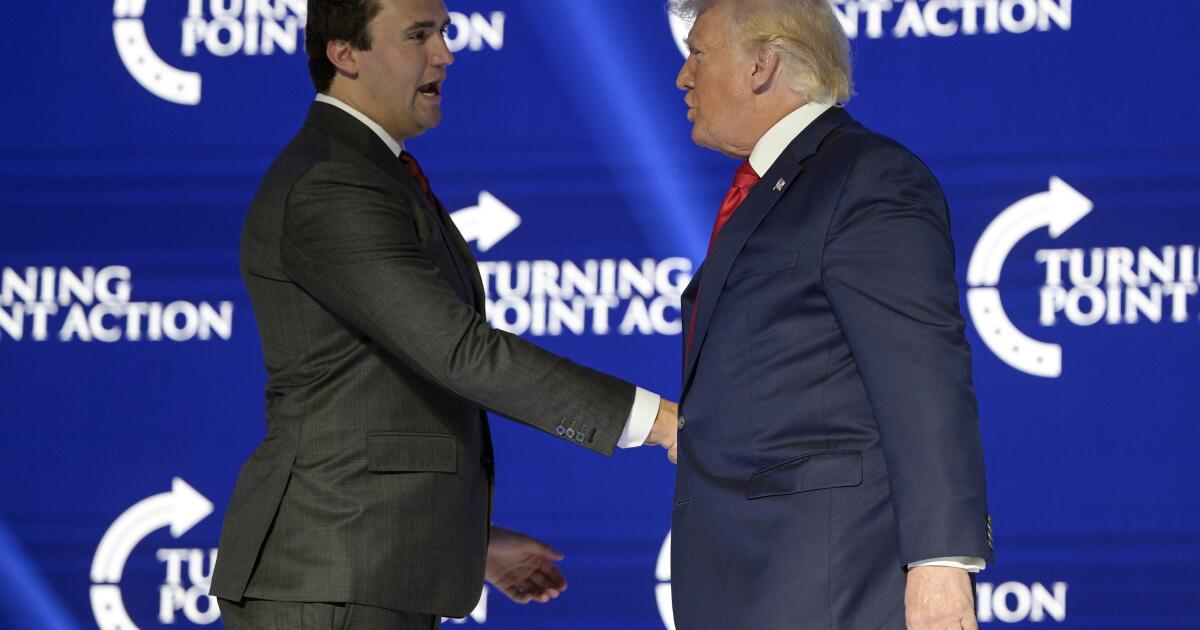They witnessed Charlie Kirk’s killing. Now students reckon with the trauma
OREM, Utah — One student holed up in his house for two days after witnessing Charlie Kirk’s shooting, nervous about going back to the Utah college campus where the conservative activist was killed. Another, unable to sleep or shake what she saw and heard, called her dad to come take her home.
As investigators spend the weekend digging deeper into suspect Tyler James Robinson, 22, ahead of his initial court appearance Tuesday, students who witnessed Wednesday’s shooting at Utah Valley University are reckoning with trauma, grief and the pall the killing has cast on their community.
Robinson’s arrest late Thursday calmed some fears. Still, questions persist about the suspect’s motive and planning, as well as security lapses that allowed a man with a rifle to shoot Kirk from a rooftop before fleeing.
The university has said there will be increased security when classes resume Sept. 17.
In Robinson’s hometown, about 240 miles southwest of campus, a law enforcement presence was significantly diminished Saturday after the FBI executed a search warrant at his family’s home. A gray Dodge Challenger that authorities say Robinson drove to the university appeared to have been hauled away.
No one answered the door at the home in Washington, Utah, and the blinds were closed.
The killing has prompted pleas for civility in American political discourse, but those calls have not always been heeded. Meanwhile, there has been a backlash against journalists and others for some comments and questions in the wake of Kirk’s death. Some have been suspended or fired.
On Friday, Office Depot said it fired a worker at a Michigan store who was seen on video refusing to print fliers for a Kirk vigil and calling them “propaganda.” On Thursday, a conservative internet personality filmed a video outside Illinois Democratic Gov. JB Pritzker’s home, urging viewers to “take action” after Kirk’s assassination. Pritzker’s security has been stepped up.
At a makeshift memorial near Utah Valley University’s main entrance in Orem, people have been leaving flowers. Cars looped nearby streets Saturday, honking horns, flying American flags and displaying messages such as “We love you Charlie,” “Charlie 4 Ever” and “RIP Charlie.”
In the area where the Turning Point USA co-founder was shot, a crew has begun taking down tents and banners and scrubbing away reminders of the killing.
Memorial brings stunned students together
Student Alec Vera stopped at the memorial after finally leaving his house Friday night for a drive to clear his head. Vera said he had been in a daze, unable to concentrate and avoiding people, since watching Kirk collapse about 30 or 40 feet in front of him.
“I just kind of felt the need to come here, to be with everyone, either to comfort or to be comforted, just to kind of surround myself with those that are also mourning,” Vera said.
One woman knelt, sobbing. Others stood quietly or spoke softly with friends. On the campus’ perimeter, trees were wrapped in red ribbons.
Several cars remained stranded in parking lots by students who left behind keys while fleeing the shooting. One student pleaded with an officer to let him retrieve his bike from beyond the police tape, smiling as the officer let him through. The university said people can pick up their belongings early this week.
Anxious about returning to campus
Student Marjorie Holt started crying when she brought flowers to campus Thursday, prompting her to change her mind about returning to campus this weekend.
Hours after the shooting, the 18-year-old said, she lay in bed, haunted by the horror she witnessed: the sound of a single gunshot as Kirk answered a question and then, “I saw him fall over, I saw the blood, but for some reason it couldn’t click to me what happened.”
Unable to sleep because of a pounding headache, nausea and the day’s trauma, she called her dad, who brought her home to Salt Lake City, about 40 miles to the north.
Returning to campus, Holt said, is “going to feel like a terrible — like a burden on my heart.”
Vera said the area where Kirk was shot is the campus’ main gathering spot — where students take naps, meditate, do homework and hang out.
“Seeing it when I go back, I will be pretty uncomfortable at first, knowing I have to walk past it each time, knowing what had just occurred here,” Vera said.
A ‘weird heaviness’
Student Alexis Narciso said he has flashbacks when he hears a bang, a honking horn or other loud noise. He was about 10 feet away.
“I just feel numb. I don’t feel anything,” Narciso said. “I want to cry, but at the same time I don’t.”
Jessa Packard, a single mother of two who lives nearby, said even with a suspect in custody, her feeling of unease hasn’t lifted. Packard’s home security system captured video of the Challenger that police say Robinson drove to campus. After the shooting, she said, law enforcement officers descended on her neighborhood, searching yards and taking security video.
“There’s this really weird heaviness and I think, honestly, a lot of fear for me personally that hasn’t gone away,” Packard said. “The fact that there was like this murderer in my neighborhood, not knowing where he is but knowing he’s been through there, coursing things out, is a really eerie feeling.”
Searching for closure from one campus to another
Halle Hanchett, 19, a student at nearby Brigham Young University in Provo, said she had just pulled her phone out to start filming Kirk when she heard the gunshot followed by a collective gasp. Hanchett said she saw blood, Kirk’s security team jump forward and horror on the faces around her. She dropped to the ground in the fetal position, wondering: “What is going on? Am I going to die?”
On Friday, she brought flowers and quietly gazed at the place where the kickoff to Kirk’s planned tour of American college campuses ended in violence.
“The last few days I’ve just, haven’t really said much. I just kind of like zone out, stare off,” Hanchett said, standing with her fiance as water fountains bubbled nearby. “The memory, it just replays.”
She’s praying for the strength to move forward, she said, “and take it as: ‘OK, I was here for this. How can I learn from this? And how can I help other people learn from this?’”
Suspect’s neighbor searches for answers
In Robinson’s hometown in southwestern Utah, neighbor Kris Schwiermann recalled him as a shy, studious and “very respectful” student who loved to read. Schwiermann, 66, was head custodian at the elementary school that Robinson and his siblings attended.
She said she was stunned by the news of his arrest, describing the Robinsons as a “very tight-knit family.”
Like the Robinsons, Schwiermann is a member of the Church of Jesus Christ of Latter-day Saints. She said that they belonged to the same congregation but that the family hadn’t been active in the church in several years.
“I want to make sure that people know that we don’t have any ill feelings towards their family or him,” Schwiermann said. “He made the wrong choice.”
Bedayn, Schoenbaum, Wasson and Yamat write for the Associated Press. Bedayn, Schoenbaum and Wasson reported from Orem. Yamat reported from Washington, Utah, and St. George, Utah. AP writers Sejal Govindarao in Phoenix, Nicholas Riccardi in Denver and Michael R. Sisak in New York contributed to this report.
